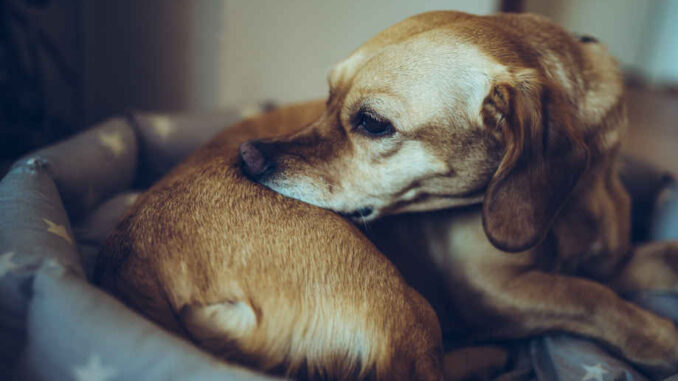
This article was updated on February 12th, 2024

In my clinic, I see many owners every week with the same complaint about their dog: They have been biting at their butt a lot recently. This article breaks down the most common causes for your dog frantically biting at their behind, and also presents easy tips to help.
Top Reasons Your Dog Bites Its Butt
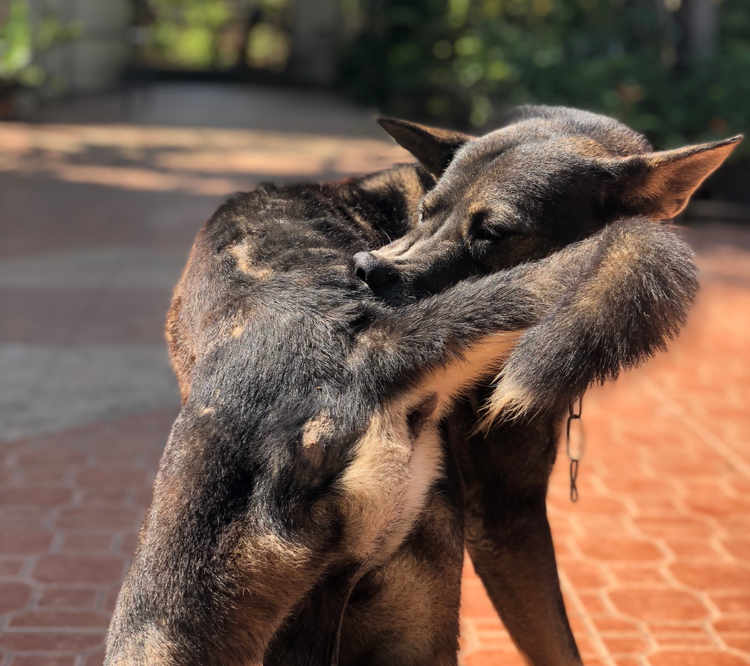
1. Anal gland issues are the most common cause
“Anal gland issues make up the bulk of consultations for dogs trying to bite their butts. For the most part, it’s an easy fix, but there could be other reasons at play.”
Anal glands are two small sacs that sit just inside the anus, positioned at roughly the 4 and 8 o’clock positions. These contain a very smelly liquid that should be naturally squeezed out when your dog goes for a poop.
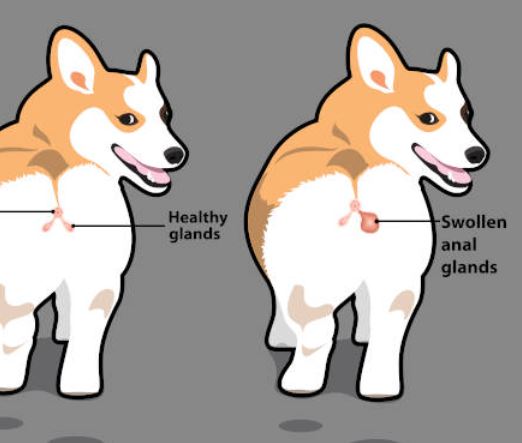
Unfortunately for many dogs, these structures fail to express, leading to a build-up of the material and a very itchy sensation. In severe cases, this material can become very hard and impacted or even infected, causing your dog extreme discomfort.
Signs that your dog’s anal glands are full include:
- Chewing at hind end
- Scooting their rear end on the ground
- Excessive licking of the anal area
- Discomfort while defecating
- A strong, foul odor around their hindquarters
- A swollen, red anus
2. Parasites (worms/ticks/fleas)
Parasites such as fleas, mites, ticks, or worms could be the cause of your dog biting at their hind end.
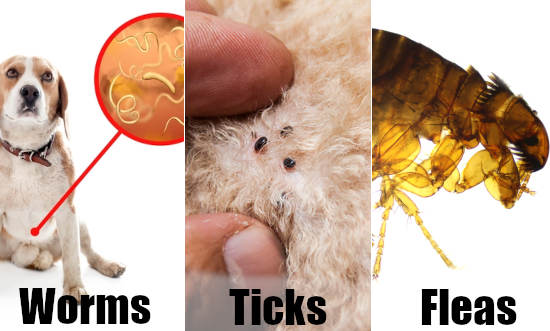
Parasites and fleas can make your dog’s life miserable: for example, fleas will bite the skin and feed on blood. Dogs will often have an allergic reaction to the flea’s saliva, resulting in inflammation and itchiness (often around the base of your dog’s tail).
How do you know if your dog has fleas?
Signs that your dog has fleas include:
- scratching or itching at other areas of the body,
- dirty fur/black specks in fur (see this picture), or
- hair loss.
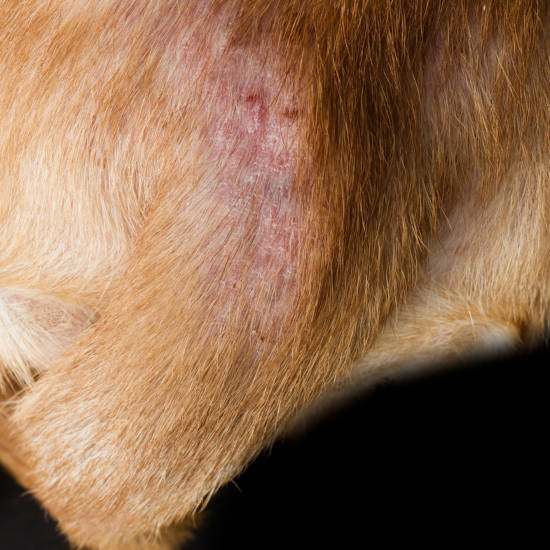
Your dog could also be infected by worms, which pass through your dog’s gastrointestinal tract and can cause discomfort around the anus when they’re pooped out.
How do you know if your dog has worms? Occasionally, you may observe worms in your dog’s poop. Other signs that your dog has worms include: weight loss, scooting and chewing at the butt, and a pot belly appearance.
Ticks or mites can also affect these areas, causing discomfort when they bite or burrow under the skin. Below is a picture of a dog biting its tail due to mites (mange):
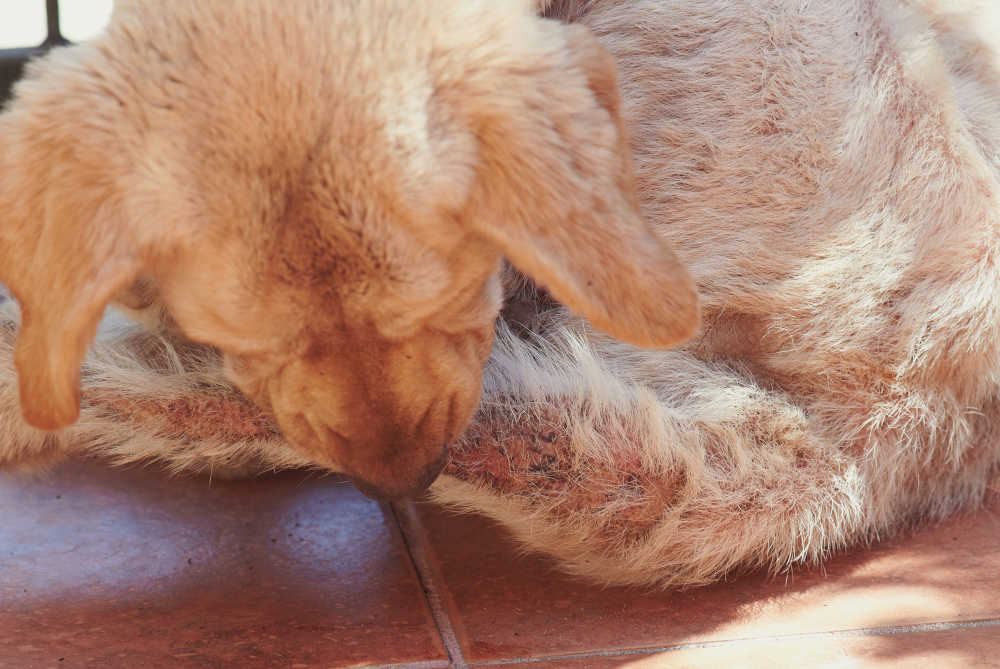
“Parasitic disease is very easily prevented AND treated; be sure to keep your dog up to date with their flea and de-worming treatments to prevent them from chewing at their butt. It is essential to prevent parasite infestation in your dog, not only for their health, but also because many parasites can also spread diseases to you and your family.”
3. Allergies or skin infections
One reason why your dog might be biting at their hind end is if they’ve sat on something that’s resulted in an allergic reaction. Dogs can be allergic to almost anything, from cleaning products to pollens. When they come into contact with an allergen, the skin reacts by becoming inflamed and irritated. Inflamed skin is very itchy and is also susceptible to infection.
The signs that your dog might have allergies or skin infections include:
- Itching at other areas of the body such as feet or ears,
- General redness to skin,
- Hair loss,
- Foul, yeasty smell coming from the skin, or
- Repeated ear infections.
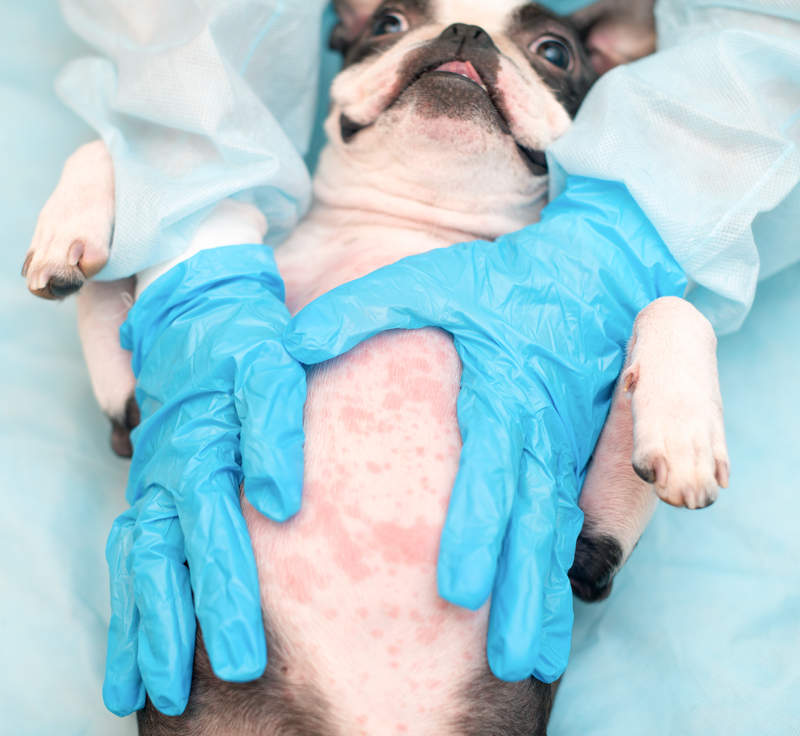
Learn more about Skin Allergy Issues.
4. Anal furunculosis
Sometimes referred to as perianal fistulas, anal furunculosis is a condition whereby abscess-like infected tracts form in the skin surrounding the anus. The skin in the area becomes very ulcerated and sore and will often lead to your dog frantically biting at the affected area. The signs that your dog might have anal furunculosis include:
- Scooting their rear end on the ground
- Frantically chewing at the back end
- Pain or discomfort when defecating
- Sore red, swollen anus
- Foul smell coming from the rear end
- Blood in stools
This is a condition that almost always requires veterinary intervention.
5. Anxiety or nervousness
“A stressed, anxious, nervous, or bored dog may sometimes chew at areas of their body in acts of self-destructive behavior. Like when an anxious human might bite their nails, a dog might chew at their butt. The first step would be to rule out other causes on this list, but if your dog is clear of other conditions, then their obsessive chewing might be down to a behavioral issue or anxiety.”
The signs that your dog might be anxious include:
- Destructive behavior
- Excessive barking
- Shaking
- Panting, whining, or drooling
To combat anxiety, take your dog out more for exercise and provide them with plenty of toys and other distractions. If those don’t work, then it may be time to visit a canine behaviorist. Learn more about Dog Anxiety.
6. Game/Playing
“The reason your dog is chewing at their butt may be more simple than you think—it could just be a game to them. Dogs will sometimes chase their own tail, and this can be extended to biting at or chewing their butt in some cases. Providing your dog with plenty of exercise and distractions will often fix this issue.”
The signs that your dog might be game playing include:
- A playful stance or hyperactive behavior
- Spinning in circles
- Play bowing
7. Foreign body/material near their tail
The reason for your dog chewing at their rear might be that there’s foreign material stuck to the fur around the anus. This could be poop, sticks, foliage, and anything in between. Be sure to check that your dog’s anus looks clean and free of foreign material because it’s likely to cause your dog irritation until cleared.
The signs that your dog might have foreign material near their tail include:
- Scooting/rubbing back end along the floor
- Fecal matting around the anus
- Constant smell of poop from the back end
How to help your dog
How to help your dog if the cause of their butt scratching is anal gland issues:
Step one is to express your dog’s anal sacs. Treatment for anal sac issues may be as simple as having your vet or groomer manually release the material from the anal sacs.
Many clinics will schedule anal gland expression as a “tech appointment” if your dog is a regular. That keeps the cost down. Expect to pay $30 to $50 (Infected anal glands will require antibiotics and a veterinary visit). Learn more about Expressing Anal Glands or How to Tell If Your Dog’s Glands Are Full.
Step two is to try canned pumpkin and probiotics. Dr. Eldredge, a veterinarian at SeniorTailWaggers.com & author of the best-seller: “Dog Owner’s Home Veterinary Handbook,” explains:
“As a veterinarian, I have recommended pumpkin along with other treatments. Because pumpkin does have a high amount of fiber, it helps to firm up stool consistency. Firmer stool means a better chance of emptying the anal glands with each bowel movement. My advice: combine canned pumpkin with probiotics & digestive enzymes.”
When buying pumpkin, remember to look for PLAIN canned pumpkin—NOT canned pumpkin pie mix, which contains fat and sugar that your dog does not need. Our vets recommend plain pumpkin at your grocery store or a product such as the following on Amazon:
- SOOTHES UPSET STOMACHS - Special formula contains high fiber pumpkin and other healthy ingredients to soothe your pet’s upset stomach
When it comes to probiotics, Glandex is a product specifically designed to help with anal sac problems. It contains both a probiotic and digestive enzyme to improve overall gastrointestinal health. A healthy gut will lead to normal stools:
- SUPPORTS HEALTHY ANAL GLANDS: Glandex is scientifically formulated to support healthy anal glands. With key ingredients including pumpkin seed, Glandex promotes natural emptying of the anal glands & supports digestive health & seasonal allergies.
Learn more with Dr. Eldredge’s 5 Tips to Help a Dog With Anal Gland Problems.
However, anal gland issues are not the only reason dogs will bite at their butts. Other reasons include parasites, allergies, and other medical conditions. Let’s take a look.
7 other tips to help your dog at home
Here are some steps and recommended products that you can use at home when your first notice your dog biting at their butt. While these are no substitute for veterinary intervention, they may be worth trying, as the problem could be an easy fix.
1. Try changing your dog’s diet: Some conditions, such as allergies, may respond to a change in diet. Consider switching to a hypoallergenic diet if dermatitis is an issue or adding more fiber to the diet if your dog is suffering from anal gland issues (read our related post: pumpkin & other solutions to help with anal glands).
2. Run anti-allergy calming baths with oatmeal water and gentle shampoo: Bathing your dog once a week can help remove any irritants or allergens that may have accumulated on his fur. This may also have a calming effect on your dog if they suffer from anxiety. Dr. Crow recommends the following shampoo:
- Gentle botanical foam-shampoo, cleans and refreshes without water leaving your pet’s fur clean and soft
3. Try an allergy chew: Allergy chews may help to alleviate the symptoms of allergy. However, they will likely only work for mild allergies, so be sure to see the vet in more severe cases.
- ✅ SOOTHING ITCH RELIEF – These dog itch relief chewables bolster your pet's immune system, providing anti-itch support to alleviate discomfort from allergic reactions like constant biting, scratching, and paws licking.
4. Try an anti-anxiety product: Anti-anxiety products such as hormone diffusers can have a calming effect on an anxious dog.
5. Use interactive toys to keep boredom at bay: Keep your dog occupied with toys and exercise to prevent them from biting at their hind end when they’re bored.
6. Check the area for bleeding, feces, or parasitic materials: Ensure that there is nothing stuck to your dog’s anus that could be causing discomfort or irritation.
7. Take your dog to the vet before the problem grows: If the problem persists for more than a few days despite the interventions above, then take your dog to the vet. The quicker treatment is started, the better the outcome.
Veterinarian Tip: When switching your dog to a new diet as a food trial, it may take 6-8 weeks for improvement!
When to schedule a vet appointment (and what to expect)
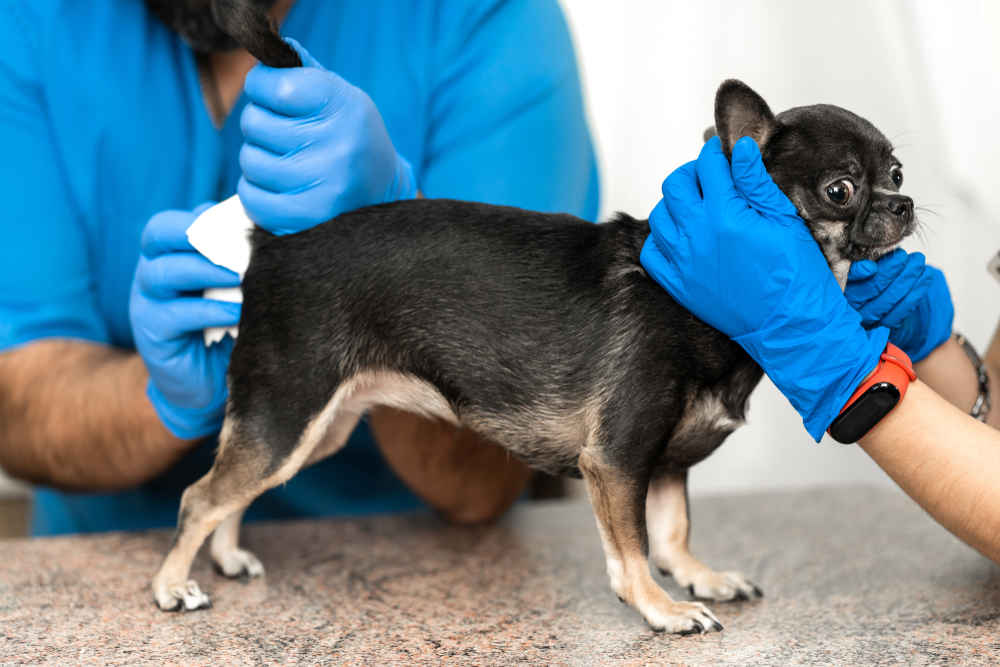
If none of the steps above work, your dog has been chewing at their butt for more than a few days, or if you’ve noticed blood or pus coming from your dog’s back end, then you must see a vet. Here’s what to expect at your dog’s vet visit:
Vet Diagnosis
Diagnosis may be as simple as examining your dog’s anus, checking for any foreign material, swellings, skin irritation, or discharge. Your vet will likely perform a rectal exam if it isn’t too painful for your dog—this involves them putting a finger up your dog’s bottom to feel for anything abnormal. They can also palpate your dog’s anal glands this way.
If your dog is itching a lot or showing signs of red skin or hair loss, your vet may suspect allergies are at play: in cases where allergy is suspected, blood tests may be performed to help identify what your dog may be allergic to. Blood tests can cost $50-$300 (in addition to the consult price).
If any unusual lumps are detected, then these might be sampled for testing.
In cases of resistant bacterial infection, then swabs may be taken for analysis into which antibiotics will work best for your dog.
Treatment costs will vary based on the cause – around $70 to $500 in most cases
Treatment will depend on the condition that is affecting your dog and could range from as little as $70 to upwards of $500. Some dogs may require a change in diet or having their anal glands emptied, in which case the costs are likely to be on the lower end.
In cases of anal gland infection or impaction, then extended courses of medication are often required, and sometimes even surgery to remove the affected anal glands. This can result in a higher vet bill.
Prognosis
A dog biting their butt is unlikely to be affected by a serious/life-threatening illness. Most of the conditions above are easily treatable. However, it’s important to bear in mind that in some cases, the issue may recur in the future, even if treated successfully on this occasion.
Anal gland tumors can be sinister and may carry a worse prognosis. Malignant tumors of the anal glands have the ability to metastasize elsewhere in the body, and, depending on how aggressive the tumor is, they may result in a reduced lifespan for your dog.
What You Should Know Before the Vet Visit
Preparation before seeing the vet is key. Make sure you know how long the problem has been going on, how often your dog chews at their butt, and any other symptoms that you’ve noticed in your dog. Your vet will likely ask you these questions, so being prepared will speed up the diagnostic process.
FAQ
Is there anything over the counter that I can give my dog?
This depends on the cause of the biting. Allergy chews or a hypoallergenic diet can help if an underlying allergy is the cause. Fiber supplements can help if anal glands are the issue. Also, be sure to keep your dog up to date with their parasite treatments.
Does it matter if my dog is biting its butt or its tail? What is the difference in prognosis?
“Either of these can indicate any of the diseases listed in this article. Some dogs will bite directly at their anus; some will bite at their tail instead in an attempt to relieve discomfort around their hind end.”
Why is my dog so itchy, but I can’t see any fleas or ticks?
“There can be many causes of a dog itching. Allergies to something in their diet or something in the environment can lead to skin itching. It’s also important to be aware that dogs can still be affected by fleas even though you can’t physically see them on your dog since most fleas will live in the environment and transiently jump on and off your dog; it’s the flea saliva that makes your dog itchy.”
My dog’s butt is bright red and raw. What should I do?
“You should take them to the vet as soon as possible. While bathing it at home with a gentle shampoo may help, it’s likely that they’ll require stronger medication to ease the inflammation.”
Related posts:
Disclaimer: This website's content is not a substitute for veterinary care. Always consult with your veterinarian for healthcare decisions. Read More.









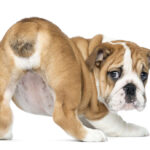

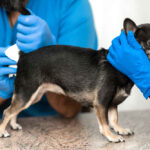
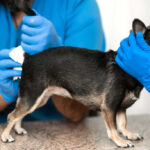
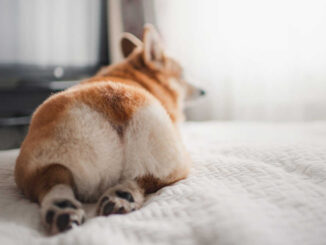
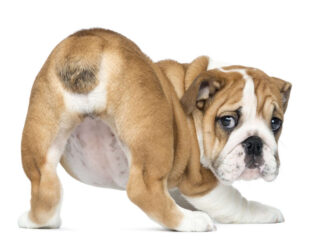
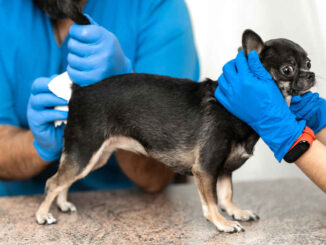
Be the first to comment